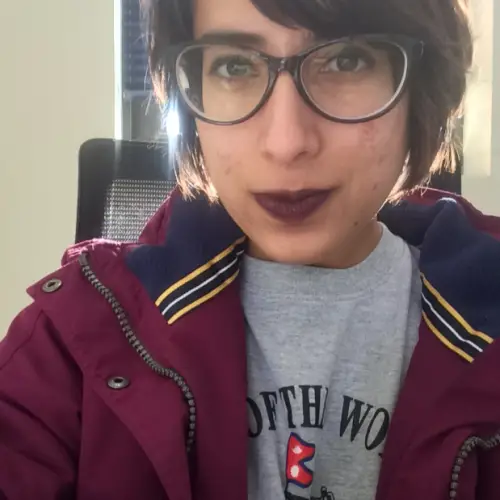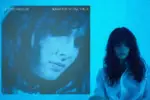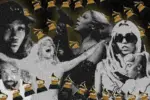Hayley Kiyoko, aka Lesbian Jesus, has blessed fans again. Kiyoko recently released her debut album, “Expectations,” and it’s got some serious bangers on it. The project explores a range of emotions that come with queer desire.
The album opener, “Feelings,” sets the tone by rejecting the idea that emotions should be repressed or hidden, an idea that queer women know all too well. Kiyoko might be oversharing, but given the dearth of pop songs about women-loving women, it’s necessary oversharing.
From there, Kiyoko gives her feelings free range, in all their messy, overflowing glory: From the melancholy of “Sleepover,” where she pines after a girl who just sees her as a friend, to the righteous indignation of “He’ll Never Love You,” where she chases after an ex who’s with a guy now but really isn’t “being honest with [herself],” Kiyoko wears her heart on her sleeve.
The album’s most memorable song, though, has to be the single “Curious.” In it, Kiyoko addresses the aforementioned ex: “Did you let him touch you? Like I used to?” she asks innocently.
“Did you take him to the pier in Santa Monica, forget to bring a jacket, wrap up in him ‘cause you wanted to? I’m just curious, is it serious?” It’s equal parts fun and deliciously bitter — completely different than the effervescent “Girls Like Girls,” which brought Kiyoko into the spotlight in 2015 — but the two songs are united by a common theme that runs through a lot of her music: watch out, dudes, ‘cause Hayley Kiyoko is here to steal your girl.
This upswell in queer lady feelings goes beyond just the rise of Hayley Kiyoko, though: There’s been a quiet, but growing surge of queer women in mainstream pop over the past few years. Even 10 years ago, the idea of even one out queer woman singing a sugary pop song about another woman on the radio would have been unthinkable, but lately, the tides seem to be shifting.
An Evolution
The trajectory of queer women in pop music over the last couple decades has been wild: starting in the not-so-promising arena of the male gaze, then taking a quick sojourn into the not-much-better world of straight-girl experimentation, until finally, miraculously, ending up with queer women taking the mic.
The first time I heard queer women mentioned on the radio was probably in “Country Grammar,” in which Nelly is super into the idea of getting with lesbian twins, and also maybe doesn’t quite understand what lesbians are. This is a pretty good indication of the state of queer women in pop in the early 2000s: They only really existed as objects of male desire.
A few years later there was, of course, Katy Perry’s “I Kissed A Girl.” As a song about a straight girl experimenting, it’s fun enough—but “I Kissed A Girl” still feels oriented toward the straight male gaze.
The constant reminders that “it’s not what good girls do,” that she “lost her discretion,” that it “felt so wrong, it felt so right,” make the whole situation feel like an elaborate performance meant to spice things up with the boyfriend, who’s probably super into it and “won’t mind it” at all. The song is still not anything close to representation for queer women.
As far as I can tell, the first time I heard out queer women on a mainstream radio station was Tegan and Sara’s “Closer,” off of “Heartthrob,” the first album in which they made the switch fully to pop. “Heartthrob” was a game-changer: before in mainstream pop, queer women were talked about, but they weren’t given the chance to do any actual talking.
One thing most of the songs on the album lack, though, is a clear indication that the relationships being sung about are between women.
Since Tegan and Sara mainly use a gender-neutral “you,” a casual listener would have no idea that “Heartthrob” is about women-loving women. Thus, even though queer women were finally given the mic, there were still representational boundaries yet to be crossed.
Within the last couple of years, things have changed drastically, again. Queer women are starting to make it far more obvious that they’re singing about being into women: Halsey and Lauren Jauregui’s duet about unrequited love for a girl, “Strangers,” uses “she” pronouns throughout; Tegan and Sara’s “Boyfriend” describes a girl who treats Sara like a boyfriend; Hayley Kiyoko’s “Gravel to Tempo” is an anthem of queer self-acceptance, reveling in being “on my own.”
This is a huge deal: By addressing sexuality head-on, these songs audibly give voice to queer women and normalize their relationships with other women.
Hello, Good Bi Representation
It’s refreshing to see bi women in particular represented in pop music because other forms of media — especially television — have so often erased bi people from existence.
TV execs, for some reason, seem to have no concept of bisexual men, a fact that was made clear in 2014 with the NBC show “Constantine,” which completely erased Constantine’s bisexuality, something that was canon in the comics. Apparently, straight people have a pretty hard time comprehending the idea that a man who is attracted to men might also be attracted to women.
Representations of bi women in film and TV have been better, but they’re still far from perfect — I’m looking at you, “Orange is the New Black,” and your refusal to say the word “bisexual.” Although it has, admittedly, been getting better over the past few years, TV has a long way to go.
In the music world, though, the last couple of years have been an unexpected treasure trove of bisexual bangers. When Janelle Monáe dances between Tessa Thompson and a guy at a club under some very ’80s (and very bi) pink and blue lights in “Make Me Feel,” when Halsey sings that she has a “boy back home in Michigan” and a “girl with California eyes” in “Bad at Love,” when Kehlani croons about liking her girls just like she likes her honey in “Honey”: let me tell you, as a certified, honest-to-god bisexual, I am living.
More than anything else, it makes me wonder what it would have been like to be growing up right now, listening to this music — I think it would have saved me a lot of lost time and many, many repressed feelings. It’s been said to death, but it remains true: Representation is important.
The Start of Something?
What is it exactly about pop music that makes it such a milestone for representation? For one, it’s a marker for the cultural mainstream; by breaking into that, queer women are radically asserting that their voices also belong. For another, pop is an intrinsically earnest, open genre, in which feelings are freely and readily expressed.
When queer women were shut out of that expression of openness, it reinforced the idea that their feelings were not normal, and that they should be hidden; when queer women were finally handed the mic and given the freedom to speak openly, these emotional barriers were broken down.
This is why it’s so important to have queer women adequately represented: Bisexual and lesbian women should be able to hear direct expressions of joy and sadness and everything in between that comes from out of their love, just like everyone else does.
It’s an exciting time in pop right now for LGBTQ+ women. The surge in women-loving-women in pop music feels like it could be the beginning of an upswell, but don’t get too excited yet. LGBTQ+ women remain drastically underrepresented in mainstream pop, with lesbians and trans women particularly underrepresented, even with the recent emergence of artists like Hayley Kiyoko and Kim Petras.
Pop music still has a long way to go in properly giving voice to queer and trans women, but in the meantime, there’s plenty of queer bops to jam out to. Gone are the days of pretending that songs about straight girls’ experimentation express the reality of the queer experience, and I, for one, am glad for that.

















